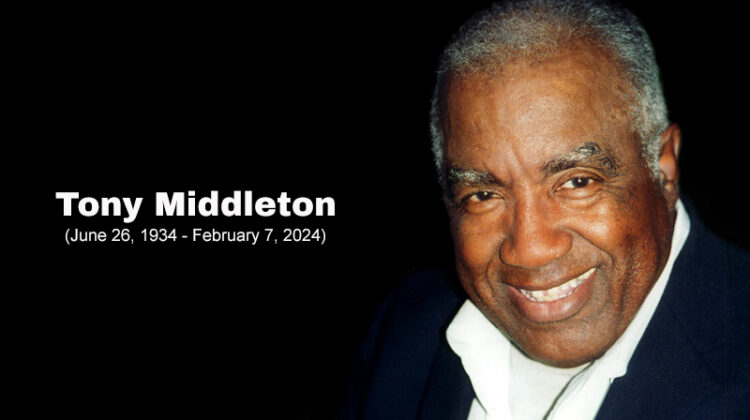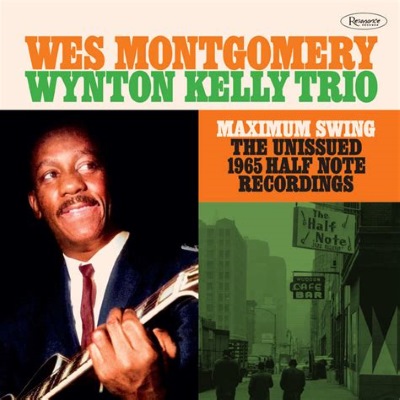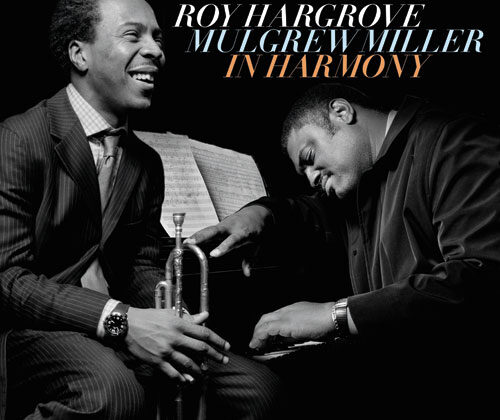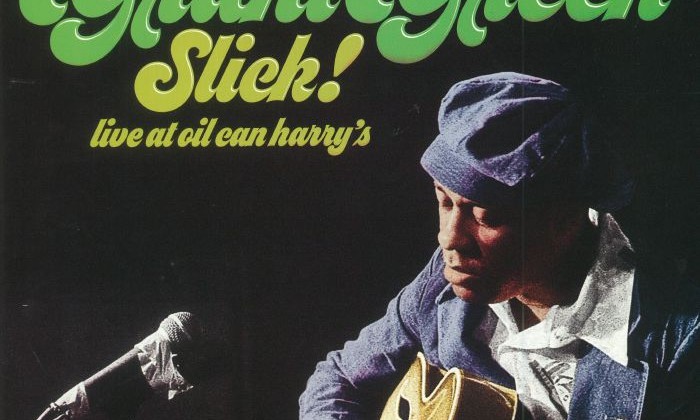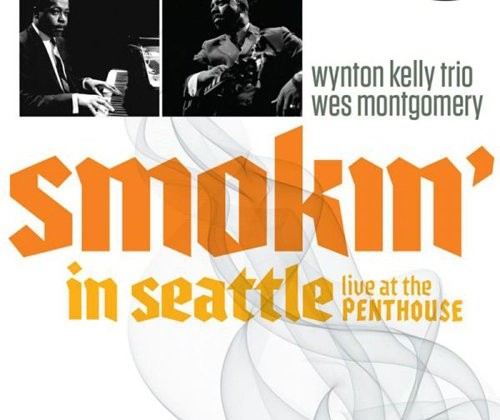This release represents quite the event, even for Resonance Records, which has produced six previous Wes Montgomery albums.
The excitement of all the professionals involved in this newly released and painstakingly engineered recording is evident in producer Zev Feldman’s essay within the CD package, which describes this album’s uniqueness within Montgomery’s discography.
The Wes Montgomery/Wynton Kelly Trio’s release, Maximum Swing: The Unissued 1965 Half Note Recordings, differs from the previous six because of the trio’s release from time constraints imposed by studios or audience expectations. The informality and family-oriented ambience of Canterino family’s Half Note Jazz Club creates a musician’s comfort zone that Montgomery enjoyed through extended improvisations—as many as he felt like playing—during his performances there in 1965 (at approximately the time that his famous Smokin’ at the Half Note album was released).
After his initial recordings on Orrin Keepnews’s Riverside Records, John Leslie (Wes) Montgomery was managed at the time of these Half Note recordings by Creed Taylor of Verve Records and A&M Records—who was known for popularizing the music of jazz artists through concision of recorded length and often accompanying orchestrations by Don Sebesky.
Thus, the excitement about Maximum Swing: The Unissued 1965 Half Note Recordings, which captured Wes Montgomery, pianist Wynton Kelly, and drummer Jimmy Cobb in a live setting without any externally imposed constraints.
Always the jazz discoverer, Feldman, who had co-produced Resonance Records’s previous Wes Montgomery releases, worked with the manager of the Wes Montgomery estate, Robert Montgomery, to produce Maximum Swing, the most inspiring yet of the company’s Wes Montgomery albums. As always, Feldman made sure that the recordings had undergone high-quality sonic engineering to maximize the digital recordings. It was fortunate that these recordings had been broadcast, and thus professionally recorded, for radio station WABC-FM’s Portraits in Jazz program, hosted by Alan Grant.
The results are exceptional, allowing for appreciation at length of Montgomery’s individualistic and influential mastery of the guitar.
True to his personalized style, the Montgomery-Kelly Trio, with Paul Chambers on bass, start the September, 1965 selections with Montgomery’s warm tone on a slow version of “Laura.” Montgomery’s interpretations is straightforward at first, the sustained notes reverberating, before he brightens the mood at double time with a swinging single-note improvisation built on half- and quarter-note triplets. The intensity rises even more when he engages the audience with his own call-and-response in the octave technique made famous by Montgomery.
Bassist Ron Carter joined the group in November for a fast and exhilarating version of “Impressions,” which presents the clarity and quickness of Montgomery’s technique, as he progresses through his three-part style of fluid single lines, spontaneous octaves, and then finishing with block chords. While the piece starts with “Impressions’s” usual call-and-response between Montgomery and Kelly, the intensity of Montgomery’s solo fills in the “responses” with a solid wall of sound.
Once again, Montgomery is on fire when he plays his well-known composition, “Four on Six,” on which bassist Larry Ridley plays the signature vamp. The music flows logically, as it always does with virtuoso musicians—without repetition. Montgomery’s thoughts zip by so quickly that his solo appears to be as natural as speaking, without considerations about individual notes/words, but rather with communication in broad themes/conversations.
“All the Things You Are” is a true representation of a nightclub performance, as the musicians, with Herman Wright on bass, reach out to the audience with rapidity, fluidity, joy, precision of articulation, and lack of concern about the pressures of time, as if time stood still. For one thing, Montgomery performs at length until he is satisfied with the completion of his extroverted “conversation” with the audience. For another, Cobb gets to solo for 1-1/3minutes, providing present-day listeners, familiar mostly with his work on Kind of Blue, with greater appreciation of Cobb’s talent.
Yoshio Tukui of the Wes Montgomery Fan Club of Japan provided the final five tracks of Maximum Swing: The Unissued 1965 Half Note Recordings: “Cherokee,” “The Song Is You,” “Four on Six,” “Star Eyes,” and “Oh, You Crazy Moon.” These tracks weren’t recorded with the closeness or equalization of microphones that the Portraits in Jazz recordings offered. For instance, Kelly’s playing receives greater clarity and volume than Montgomery’s. Nonetheless, these five recordings confirm the trio’s same ease of improvisation and technical excellence, making the tracks complements to Resonance Records’s dedication to comprehensiveness.
Wes Montgomery is one of those jazz artists whose riches abound to such an extent that written analytical descriptions from active listening could go on for pages. But jazz writer Bill Milkowski already did the close listening and the astute writing. Milkowski’s essay in the booklet that the Maximum Swing package includes describes each track with insightful details—if not note for note—then literally bar for bar, and chorus for chorus. His essay is not only an informative and informed technical appreciation, but also an emotional appreciation for the enjoyment that Montgomery’s works provide.
The booklet also includes longer-than-usual essays from jazz icons, such as Herbie Hancock, Ron Carter, Bill Frisell, Marcus Miller, and Mike Stern. Interestingly, both Hancock and Carter note that they didn’t really know Montgomery because of his shyness and modesty. Early in his career, Montgomery kept returning to his family in Indianapolis, even as his brothers moved to the West Coast. Wes Montgomery’s happenstance recordings with them, and his local performances at the Missile Room in Indianapolis, brought his talent to the attention of record producers like Keepnews and of other musicians like Cannonball Adderley, who were knocked out by his talent.
Still, one wonders if Wes Montgomery was ever comfortable with the compliments and his fame, as he always returned to his family and his hometown of Indianapolis, where he died on June 15, 1968.
Artist’s Web Site: https://wesmontgomery.com
Label’s Web Site: www.resonancerecords.org








